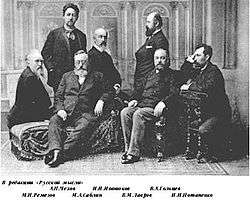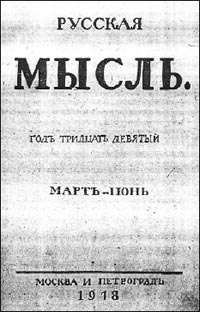Russkaya Mysl
|
The last official Russian issue of Russkaya Mysl, 1918 | |
| Editor | Vukol Lavrov, Sergey Yuryev, Viktor Goltsev, Alexander Kisevetter, Pyotr Struve |
|---|---|
| Frequency | Monthly |
| Circulation | up to 13,000[1] |
| First issue | 1880 |
| Final issue | 1927 |
| Based in |
Moscow, Russian Empire Paris, France (1918–1927) |
| Language | Russian |
Russkaya Mysl (Russian Thought, Русская мысль) was one of Russia's most popular magazines of the late 19th and early 20th centuries. It was founded in Moscow in 1880 by Vukol Lavrov, closed in 1918 by Bolsheviks, resurrected abroad first in Sofia, then Prague and in Paris. In 1927 Russkaya Mysl closed for good.[2][1]
History
Russkaya Mysl was founded in 1880 in Moscow by Vukol Lavrov as a moderate pro-Constitution publication and is seen as the ideological background for the Constitutional Democratic Party which it played an important part in organization of. Up until 1906 the magazine's publisher and editor in chief was Lavrov. He translated a lot from Polish which helped the rising popularity of the contemporary Polish fiction. In 1880–1885 the editor of Russkaya Mysl was Sergey Yuryev who brought it close to the Slavophiliac movement. After Yuryev's death Viktor Goltsev became the editor; under his guidance the magazine made a turn to the left and provided safe haven for many contributors of the recently closed Otechestvennye Zapiski, taking upon itself some of the latter's subscription obligations. This, as well as dropping the standard price from 16 to 12 rubles per issue, helped its popularity rise.[1]
In 1906, after Goltsev's death, Alexander Kisevetter became the editor-in-chief; he invited Pyotr Struve as a co-editor. The magazine started actively discuss latest political, social and religious reforms. Lavrov was still a stuff member but now his works were published not that often. One specific feature of Russkaya Mysl was the Bibliography section which informed the readership of all that was new in Russian literature and journalism. The journal also ran its own The Scientific review and The Modern Art sections, the latter specializing mostly in the Moscow theatrical life.[1] From 1905 onwards Russkaya Mysl became the organ of the right wing of the CD party with a strong Vekhi connection.[1]
Russkaya Mysl had an eclectic taste, tending to provide a tribune to authors ignored or shied by other magazines and newspapers. In it appeared works by such authors as Nikolai Leskov, Konstantin Sluchevsky, Alexey Apukhtin, Count Arseny Golenishchev-Kutuzov, Grigory Danilevsky. Both Marxism followers, 'economic materialists' and narodniks here were equally welcomed, as well as writers who attempted to make peace between warring ideological and literary factions.

The magazine's Domestic Review ran under the guidance of Viktor Goltsev, S.A.Priklonsly, A.A.Golovachyov, Leonid Polonsky. Close to this section were the Sketches of Russian Life that Nikolai Shelgunov and later the Sketches of the Provincial Life by the economist Ivan Ivanyukov. For ten years Goltsev was also the head of the The Foreign Review section.[1]
Among the fiction writers published by the magazine were Mikhail Albov, Nikolai Astyrev, Kazimir Barantsevich, Pyotr Boborykin, Nikolai Vagner, Vsevolod Garshin, Maxim Gorky, Dmitry Grigorovich, Alexey Zhemchuzhnikov, Nikolai Zlatovratsky, Nikolai Petropavlovsky (S.Karonin), Vladimir Korolenko (he debuted here with "Makar's Dream"), Alexey Tikhonov (A.Lugovoy), Dmitry Mamin-Sibiryak, Dmitry Merezhkovsky, Nikolai Minsky, Alexander Sheller, Semyon Nadson, brothers Vasily and Vladimir Nemirovich-Danchenko, Filipp Nefyodov, Vasily Ogarkov, Yakov Polonsky, Ignaty Potapenko, Ilya Salov, Nadezhda Merder (N.Severin), Konstantin Stanyukovich, Gleb Uspensky, Semyon Frug, Anton Chekhov, Alexander Ertel.
Russkaya Mysl regularly published works by literary critics Mikhail Gromeka (he was the one who gave the publicity to the unknown parts of Lev Tolstoy's Confession), Alexander Kirpichnikov, Orest Miller, Nikolai Mikhaylovsky, Viktor Ostrogorsky, Mikhail Protopopov, Alexander Skabichevsky, Vladimir Spasovih, Nikolai Storozhenko, Semyon Vengerov. Regularly contributed to the magazine were anthropologist and ethnographist Dmitry Anuchin, historians Pavel Vinogradov, Nikolai Kostomarov, Pavel Milyukov, Robert Vipper, Yevgeny Karnovich, Nikolai Kareev, Vladimir Gerye, Grigory Dzhanshiyev, Mikhail Korelin, climatologist Alexander Voyeykov, economists Ivan Ivanyukov, Andrey Isayev, Lev Zak, Nikolai Kablukov, Nikolai Chernyshevsky (who under the moniker of Andreev published here his poems too), lawyers Count Leonid Kamarovsky, Pyotr Obninsky, Sergey Muromtsev, Maxim Kovalevsky, philosophers Vladimir Lesevich, Vladimir Solovyov, zoologist Mikhail Menzbir, philologists Fyodor Mishchenko, Vasily Modestov.[3]
Later years
In 1907 the magazine radically changed its course and, according to Brockhaus & Efron, started a new life of a leader of the Russian intellectual journalism. It became the centre of the religious intellectuals, spiritual leaders, liberal opposition, promoting the ideas of constitutional state, calling for mobilizing all the intellectual forces of Russia to implement the reform of the whole way of life in the country. Russkaya Mysl supported the so-called "God-searching movement" and the early 19th-century religious Renaissance.[2]
The magazine denounced the 1917 Revolution as a national catastrophe. In 1918 it was closed by the Bolshevist government. Pyotr Struve continued to edit Russkaya Mysl in emigration, as the Cadets united with the Russian Monarchists.[2]
References
- 1 2 3 4 5 6 "Russkaya Mysl". brockhaus-efron-encyclopedia.info. Retrieved 2012-03-01.
- 1 2 3 "Russkaya Mysl". slovari.yandex.ru. Retrieved 2012-03-01.
- ↑ Russkaya Mysl at the Soviet Historical Encyclopedia. Ed. E.M. Zhukov. Sovetskaya Encyclopedia Publishers. 1973—1982.
